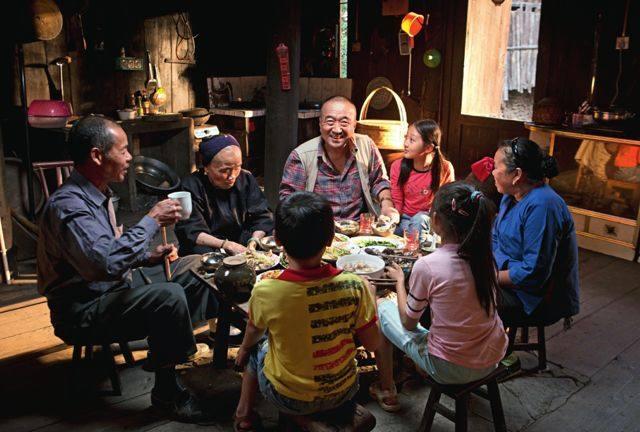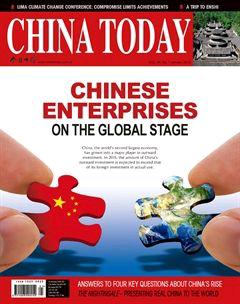The Nightingale
By TANG YUANKAI



FRENCH director Philippe Muyl was recently surprised to learn that his film The Nightingale (Le promeneur doiseau), jointly produced by China and France, would compete for Best Foreign Language Film Prize at the 87th Academy Awards. The director says this is a sign that Chinas film industry is opening up.
In 1991, Ju Dou, directed by Zhang Yimou, was the first Chinese-language film to win an Oscar nomination. Over the next 12 years, Chinese-language films were nominated seven times for Oscars, and Ang Lees Crouching Tiger, Hidden Dragon won on behalf of Taiwan. But for the past 11 years, no Chinese film has been short-listed for an Oscar.
The Nightingale was screened at more than 30 international film festivals before its Chinese debut on October 31, 2014. It won Audience Award at the 16th RiverRun Film Festival in the U.S. and the Golden Slipper award at the 54th Zlín Film Festival in the Czech Republic. At the Shanghai International Film Festival, the film was nominated for five awards and its lead actor Li Baotian won a Media Award.
These successes have raised hopes for an Oscar in 2015.
Tribute to a Country Amid Reform
“Selecting The Nightingale shows that a co-production may represent Chinese films on the global stage,” Philippe Muyl said. “It shows a bright, heartwarming and optimistic China which is striving to solve existing problems. That makes us stand out.”
Before coming to China to direct The Nightingale, Philippe Muyl thought it would be “an adventure.” Yet after arriving, he realized that China is not the same country as that portrayed in the news. He felt that he had a responsibility to record Chinas realities so as to “present the real China to the world.”
“To some extent, China currently remains unknown to many Westerners. Sometimes it is misinterpreted,” Philippe Muyl said. “The French talk about China almost every day, but few have ever actually been to the country. They have no idea what China looks like and simply believe what they have seen on television, often focusing on negative aspects like environmental pollution.” Therefore, he says, people should visit China for themselves or go to see The Nightingale. “You will find many attractive things in China besides smog – beautiful scenery, kind people, ancient culture and modern vitality.”
“The film tells an original Chinese story with Chinese actors. But I adopted a narrative form familiar to Western audiences to make it easier to understand,” Muyl said.

In early May 2014, The Nightingale was released in French cinemas and was a box office hit. Its receipts exceeded Hollywood blockbusters and several French films shown at the same time. Running for over half a year, it has become the first noncommercial Chinese film to run so long in French cinemas. One in 500 French people have seen this film.
According to a French film magazine survey, 100 percent of viewers were “satisfied” with this film while 69 percent of them were “very satisfied.”Another French magazine called it an awesome film that enabled audiences to dive into a modern China. Le Figaro said that this lively and emotional Chinese fable leads people on a spiritual path. The warm story, filmed by a French director in China, can be deemed as a tribute to a country in the process of reform. Les Echos wrote that in recent years, Westerners have received too many negative images of China. The Nightingale shows the bright and happy China that Westerners have long ignored.
Back to Family
Philippe Muyl now sees China as his second home, and cannot remember how many times he has visited the country. The director spent a year and half learning Chinese for the filming of The Nightingale. Every day he wrote his diary using Chinese pinyin and handed in to his Chinese teacher the next day for corrections.
Having lived in China for quite a while, Philippe Muyl is familiar with the countrys conditions. As an observer, he often reflects on Chinas breakneck speed of life. People are under increasing pressure from social development and an accelerating pace of life. Many individuals and families are losing their sense of balance. “Many people are so busy that they are living in cars or on airplanes. Families become estranged and exist in name only.”
In the movie, an old man, played by veteran actor Li Baotian, wants to keep a promise to his dead wife by returning to their hometown with his only friend, an 18-year-old nightingale. But he has to bring his 8-year-old granddaughter with him as his son and daughter-in-law are taking business trips at the same time. The granddaughter, however, has no desire to travel to a strange town with her grandfather who she rarely meets. The two companions from different generations make a journey full of“surprises” and adventures.
“Its a film that focuses on family life in a modern era. China has experienced rapid development in recent years. How does a family, the basic unit of a society, adapt to social changes?” Muyl explained the problems probed in his film. “Rapid progress in a modern society causes imbalances in peoples minds. It is necessary to return to our hearts, our families and hometowns, to search out lost roots and traditions. China and the rest of the world are all developing fast and facing the same issue of fragmented families. The film reveals a universal theme,” the director said.
Poor upbringing is the most serious problem concerning families. The granddaughter in the film has many shortcomings. Muyl agrees with traditional Chinese beliefs that morality is shaped in early childhood, reflected by their attitudes towards older generations and parents. Children learn to understand responsibility, filial piety, gratitude and devotion in the family home. “Obviously, if family education is incorrect or insufficient, itll be difficult for a child to grow with a good personality,” he emphasized.
Many plotlines in the film involve electronics. The granddaughter plays with her iPad during the journey and disdains her grandfathers oldfashioned mobile phone. This is a trend that Muyl observed during his stay in China. Younger generations prefer to keep their eyes on small screens rather than on the faces of their family members or friends. “I saw piles of flowers at the door of Apple stores in Beijing on the day Steven Jobs died. It surprised me to learn that a foreigner could have so many followers in China. “
During the last days of the trip, the grandfathers nightingale dies. The girl trades her iPad with a local boy for a similar bird in order to console her grandfather. After returning to the city, the girl completely changes and leads her parents to a different, more balanced way of life, in which family members cherish what is most valuable.
Coproduction in Chinas Movie Sector
The Nightingale is the second film coproduced by China and France following a film coproduction treaty signed in 2010. China coproduced its first feature film in 1913 with an American company. But Muyl is the first foreign director to lead a Chinese coproduction over the last 100 years.
“According to treaties between China and other countries, coproduced films can be considered as homegrown films in both of the treaty countries. Unrestricted by Chinas limits on import films, coproductions may expect a good box office in each participating country while investors have more ways to recover their investment,” said Ning Ning, producer of The Nightingale. These productions are expected to promote changes in Chinas film industry. Before, filmmakers rarely looked abroad. But now that they are able to cooperate with their overseas peers in investment, human resources, technology, and marketing, they also expect to broaden their horizons.
The Nightingale is considered a successful coproduction. “It is an achievement of the whole team.” The director mentioned that he was quite impressed with the flexibility and efficiency of Chinese filmmakers. “At one point, I had to change my shooting plan and move the filming site to the other side of a river. For a change like this in France, we have to wait at least two or three days for the producers response. But my Chinese peers managed to find a bamboo raft in just one hour to take me to the opposite riverbank.”
Filming for The Nightingale finished in 2013. In that year, Chinas box office totaled nearly RMB 20 billion. While other sectors in China are growing at five to 10 percent annually, the film industry grew by over 30 percent, attracting global capital in all fields.
This is one of the reasons that Ning Ning invited Muyl to make a quality film that “conveys positive energy and is suitable for the entire family both in China and abroad.” It was not an impulse, but a decision based on a professional producers rational judgment and market research.
“The success of Muyls The Butterfly (Le Papillon) qualifies him to direct this Chinese movie,”Ning Ning explained. The Butterfly was not only well received in France, but also won the heart of Chinese audiences. “The Nightingale resembles The Butterfly in its theme of family love.” Ning Ning continued, “I am deeply moved by this theme and I believe it will break into a wider market both at home and abroad.”

